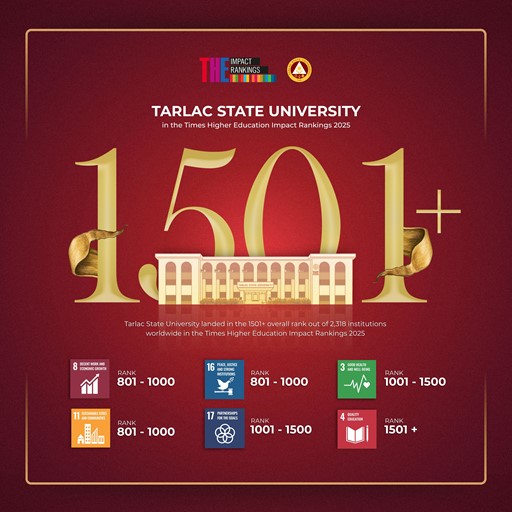
Wed, Jun 18, 2025
TSU ranks on 6 SDGs in THE Impact Rankings 2025
The Bachelor of Science in Environmental Science (BS ES) is a relatively new program offered by the TSU College of Science that trains students to become successful environmental scientists, environmental officers and managers, environmental analysts, and other professions related to the field. Environmental Science deals with the assessment and monitoring of air, water, and soil, natural resources, human impact on ecosystems, and environmental pollution.
Students in this program take up chemistry, biology, ecology, earth science, physics, and mathematics as the foundation courses to help them analyze the environment in an interdisciplinary and integrative approach. Students also take up economics, laws, and geography for environmental management. The program can be finished in four (4) years.
GOALS OF THE DEPARTMENT OF ENVIRONMENTAL SCIENCE
The department of Environmental Science has four-fold goals with corresponding objectives:
PROGRAM OBJECTIVES
The BSES program aims to expose students in an integrated way of environmental processes and phenomenon, as well as environmental issues, from the perspective of the natural sciences. It aims to train them to recognize and understand the natural environment, how humans affect the environment, and how the environment impacts on society.
Program Outcomes
At the end of the program, a BS ES graduate should at the minimum be:
Career Opportunities
Graduates of BS ES Program can be employed at the entry-level of science positions. BS ES graduates can engage in work related to air and water quality management, energy and resource management, planning and design, waste management and environmental assessment.
In particular, BS ES graduates can work as environmental impact assessors, environmental officers, conservation and resource management staff, project planning and assessment and program/project/technical personnel in private companies, non-government organizations and government agencies. BS ES graduates are also encourage to pursue graduate education for further specialization (Adopted from CMO No. 35 series of 2005)
ACTIVITIES: BACHELOR OF SCIENCE IN ENVIRONMENTAL SCIENCE
Extension Activities
Student Activities
Students of the BS ES Program attended and co- organized the conduct of the Philippine Solid and Hazardous Waste Management Conference held on December 10-13, 2019.
Officers of the TSU Environmental Science Society attended the GREENducation Seminar and Workshop for SK Youth Leaders on November 27-29, 2021 at the Azzuro Hotel, Angeles City, Pampanga
The College of Science aims to produce a fully functioning and excellence graduates who can perform the competencies under each of the Key Areas of Responsibility. To achieve the college goals and objectives, a Faculty Development Program is a critical factor towards building a strong foundation in the execution of the program to ensure quality education. The quality of education depends largely on the qualifications and competencies of the faculty, thus regular meeting, seminar-workshop, and evaluation is being conducted in the college and university level.
COLLEGE CHAIRPERSONS MEETING